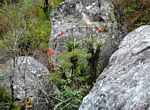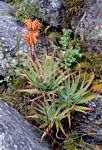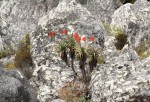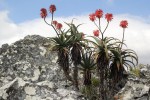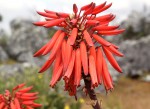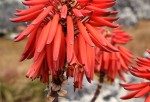| Home | > | List of families | > | Asphodelaceae | > | Aloe | > | munchii |
Aloe munchii
Selected images: Click on each image to see a larger version and details of the record View all images (11)
Detailed records: Display species records QDS maps by: Google Maps Point records by Google Maps
Species details: Click on each item to see an explanation of that item (Note: opens a new window)
| Synonyms: | |
| Common names: | Munch's great chimanimani aloe (English) |
| Frequency: | |
| Status: | Native |
| Description: |
Large succulent shrub-like plant, single-stemmed or branching near the base, 2-5 m tall. Leaves in a dense rosette at the apices of the branches, up to c. 50 cm long, greyish-green,without spots but often tinged pinkish-red, particularly along the toothed margins. Inflorescences 1-2 from each rosette, erect, branched, up to 60 cm tall, each branch terminating in a dense subcapitate head, 10-14 cm long. Flowers bright orange-red, 35-45 mm long. |
| Type location: |
|
| Notes: | The taxonomic status is not sufficiently known. It has been suggested that it may be an adapted form of Aloe excelsa although the flowering habit looks very different. |
| Derivation of specific name: | munchii: after Raymond Charles Munch (1901 - 1985), Zimbabwean farmer and plant collector with a particular interest in aloes and cycads. |
| Habitat: | In quartzite grasslands on mountain slopes, growing among large boulders where it is somewhat protected from fires. |
| Altitude range: (metres) | 1525 - 2135 m |
| Flowering time: | July |
| Worldwide distribution: | Chimanimani Mountains in Zimbabwe and Mozambique |
| National distribution: | C,E |
| Growth form(s): | Tree. |
| Endemic status: | Near Endemic |
| Red data list status: | Data deficient |
| Insects associated with this species: | |
| Spot characters: | Display spot characters for this species |
| Images last updated: | Saturday 2 August 2014 |
| Literature: |
Biegel, H.M. (1977). Check-list of ornamental plants used in Rhodesian parks and gardens. Rhodesia Agricultural Journal. Research Report No. 3. Page 21. Burrows, J.E., Burrows, S.M., Lötter, M.C. & Schmidt, E. (2018). Trees and Shrubs Mozambique Publishing Print Matters (Pty), Cape Town. Page 54. (Includes a picture). Carter, S. (2001). Aloaceae Flora Zambesiaca 12(3) Page 98. Chapano, C. & Mamuto, M. (2003). Plants of the Chimanimani District National Herbarium and Botanic Garden, Zimbabwe Page 5. Coates Palgrave, K. (revised and updated by Meg Coates Palgrave) (2002). Trees of Southern Africa 3rd edition. Struik, South Africa Page 111. Darbyshire, I., Timberlake, J., Osborne, J., Rokni, S., Matimele, H., Langa. C., Datizua, C., de Sousa, C., Alves, T., Massingue, A., Hadj-Hammou, J., Dhanda, S., Shah, T., Wursten, B. (2019). The endemic plants of Mozambique: diversity and conservation status Phytotaxa 136 Page 76. Drummond, R.B. (1975). A list of trees, shrubs and woody climbers indigenous or naturalised in Rhodesia. Kirkia 10(1) Page 232. Golding, J.S. (ed.) (2002). Zimbabwe Plant Red Data List. Southern African Plant Red Data Lists. SABONET 14 Page 178. Mapaura, A. (2002). Endemic Plant Species of Zimbabwe. Kirkia 18(1) Page 126. Mapaura, A. & Timberlake, J. (eds) (2004). A checklist of Zimbabwean vascular plants Southern African Botanical Diversity Network Report No. 33 Sabonet, Pretoria and Harare Page 84. West, O. (1974). A Field Guide to the Aloes of Rhodesia. Longman, Salisbury Pages 94 - 95. (Includes a picture). Wild, H. (1964). The endemic species of the Chimanimani Mountains and their significance Kirkia 4 Page 135. Wursten, B., Timberlake, J. & Darbyshire, I. (2017). The Chimanimani Mountains: an updated checklist. Kirkia 19(1) Page 81. |
Other sources of information about Aloe munchii:
Our websites:
Flora of Mozambique: Aloe munchiiFlora of Zimbabwe: cultivated Aloe munchii
External websites:
African Plants: A Photo Guide (Senckenberg): Aloe munchiiAfrican Plant Database: Aloe munchii
BHL (Biodiversity Heritage Library): Aloe munchii
EOL (Encyclopedia of Life): Aloe munchii
GBIF (Global Biodiversity Information Facility): Aloe munchii
Google: Web - Images - Scholar
iNaturalist: Aloe munchii
IPNI (International Plant Names Index): Aloe munchii
JSTOR Plant Science: Aloe munchii
Mansfeld World Database of Agricultural and Horticultural Crops: Aloe munchii
Plants of the World Online: Aloe munchii
Tropicos: Aloe munchii
Wikipedia: Aloe munchii
| Home | > | List of families | > | Asphodelaceae | > | Aloe | > | munchii |
